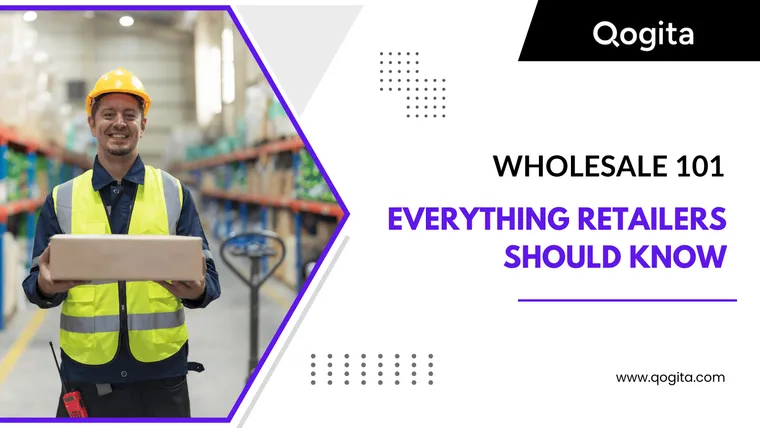What is wholesale? Is it about buying in bulk at lower prices? Is there more to it?
If you run a retail business, the term "wholesale" means more than just a big order.
It represents the backbone of your business: the entire system that moves products from the manufacturer to your shelves. Understanding this system is crucial, as it dictates your pricing, inventory control, and ultimate profitability.
This guide explores exactly what is wholesale, how it works, the different types of wholesalers, and what challenges and opportunities it creates for retailers today.
What Is Wholesale?
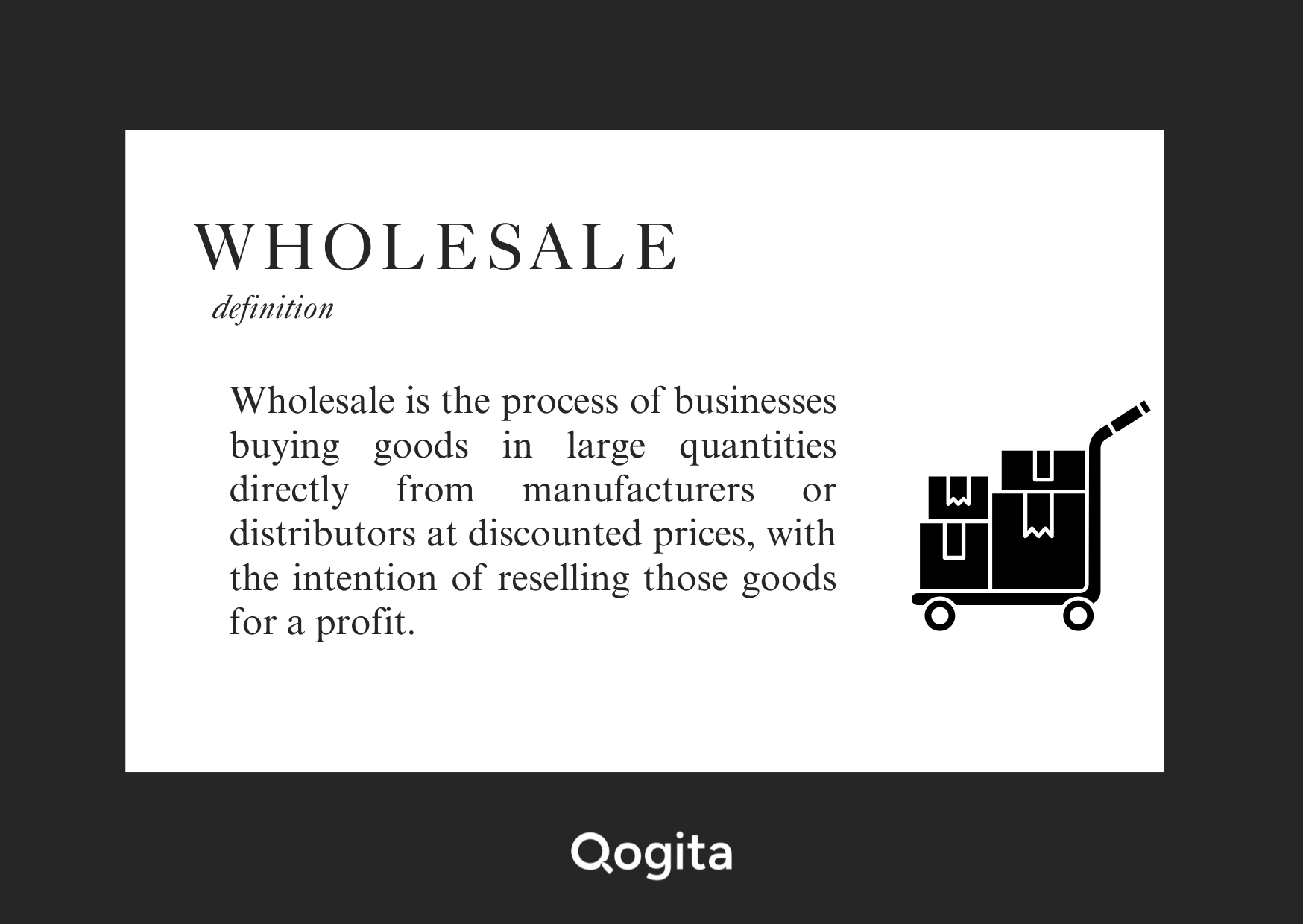
Wholesale involves the process of buying goods in large quantities from manufacturers or producers and then selling them to retailers or other businesses.
When wholesalers buy products in large quantities, they get them at lower prices. This means retailers can buy enough stock to sell in their stores without paying as much, leading to higher profit margins.
From a retailer’s perspective, wholesale is a way to source products efficiently. Buying in bulk reduces costs and ensures you have enough stock to meet customer demand.
Now you might be wondering, "Is wholesale only about buying in bulk?"
While bulk transactions are typical in wholesale, they are not mandatory. Some online wholesale marketplaces like Qogita and Faire accept smaller orders, especially when they are building a relationship with a new retailer.
This flexibility makes wholesale accessible even for smaller or emerging retail businesses.
What Is a Wholesale Business?
A wholesale business is a business model where the company buys goods in large quantities from manufacturers and then sells these goods in smaller quantities to retailers.
The wholesaler makes money by getting a good discount from the manufacturer for buying in bulk and then earning a margin when selling to retailers.
For example, a wholesaler may buy 10,000 bottles of shampoo from a manufacturer at a lower rate. He then sells these bottles in smaller lots of 100 or 500 bottles to different retailers (as we explained in the breaking bulk function of wholesale).
Each retailer gets the quantity they need, while the wholesaler earns his profit on every transaction.
Thus, the wholesale business acts as a middle link between the manufacturer and the retailer, ensuring a continuous supply of goods while also making profits through bulk buying and efficient distribution.
Where Wholesaling Fits in the Supply Chain
Wholesale distribution serves as a vital link in the supply chain as it connects manufacturers with retailers. The typical flow is:
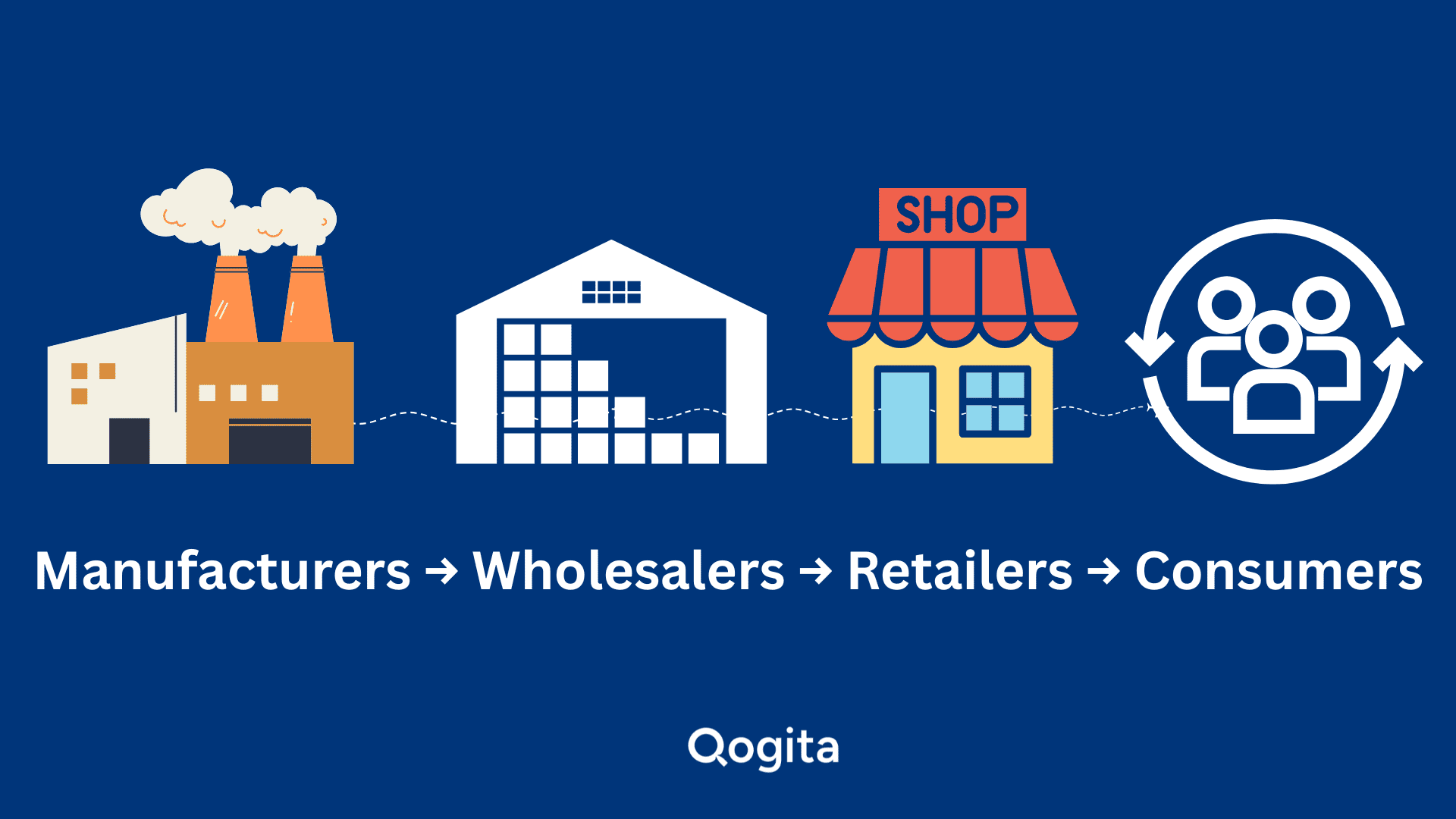
Wholesalers buy products in bulk quantities from manufacturers and then distribute them to retailers. They take care of storing and moving the goods, so manufacturers can focus on producing them.
Retailers benefit by getting access to a wide range of products without the hassle of dealing with multiple manufacturers directly.
Who Is a Wholesaler?
A wholesaler, sometimes called a whole seller, is a business that buys products in bulk from manufacturers and resells them to retailers.
When we ask, “Who is a wholesaler?” or “What do wholesalers do?” we are referring to these key roles, which include purchasing, storing, and distributing products.
Crucially, wholesalers do not sell directly to consumers. Their focus is solely on supplying retailers to keep shelves stocked and meet market demand.
What Is Wholesale Price?
Wholesale price is the amount a wholesaler charges a retailer for products bought in bulk. It is always lower than what the customer finally pays at the store because retailers need room to add their own margin.
The price is set this way because wholesalers move goods in large volumes, which lowers per-unit handling and operating costs.
Different Types of Wholesalers Explained
Various types of wholesalers exist depending on the kind of products they deal with and the role they play in the supply chain.
While merchant wholesalers take ownership of the products they sell, other types facilitate transactions without holding any inventory.
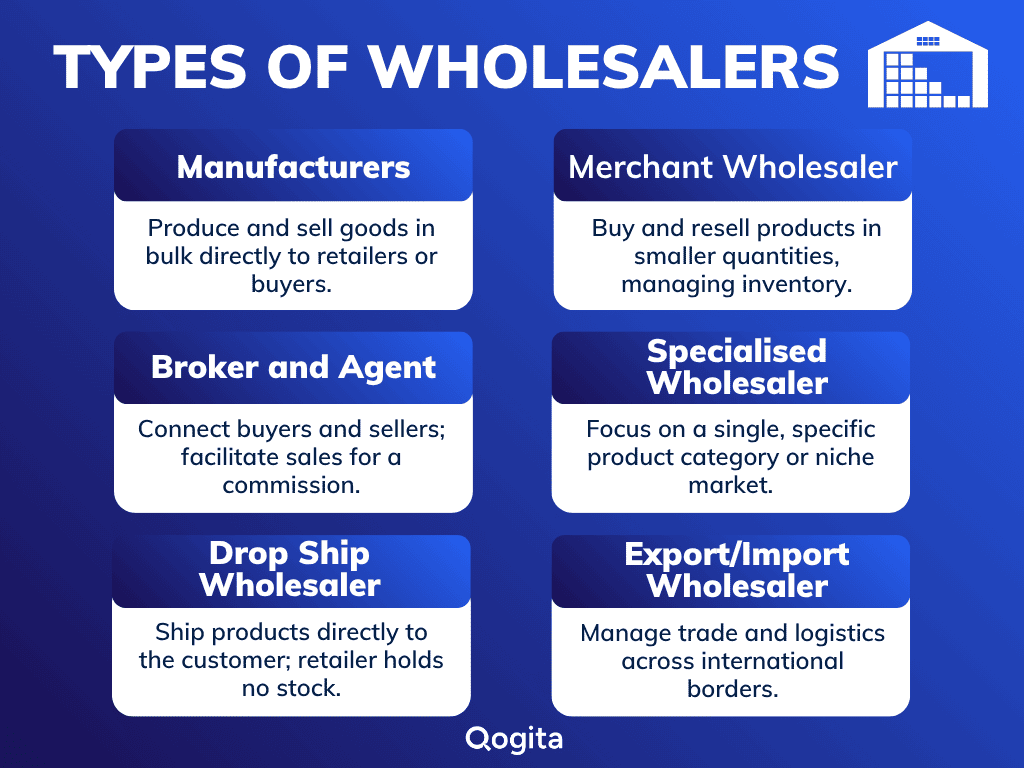
1. Manufacturers
Manufacturers are the primary producers of goods as they transform raw materials into finished products at scale. They sometimes engage in wholesaling by selling directly to retailers, suppliers, or other wholesalers.
For example, a European electronics manufacturer might supply large volumes of smartphones to specialised wholesalers or major retail chains, bypassing smaller intermediaries.
This allows manufacturers to maintain full control over pricing and product availability while reaching a wide market efficiently.
2. Merchant Wholesalers
Merchant wholesalers are one of the most common types of wholesalers.
They buy goods in bulk from manufacturers, store them in their own warehouses, and resell them to retailers or other businesses. These wholesalers take ownership of the products and assume the risks related to inventory and storage.
A typical example is food distributors in Europe who supply supermarkets and restaurants with beverages, packaged foods, and other consumables.
3. Brokers and Agents
Unlike merchant wholesalers, brokers and agents do not take ownership of goods. They act as intermediaries as they connect manufacturers with retailers or other wholesalers and earn a commission for their services.
In the European pharmaceutical sector, brokers and agents are essential for linking manufacturers with hospitals, clinics, and healthcare centres. They make sure that all products reach the right buyers efficiently.
4. Specialised Wholesalers
As the name suggests, specialised wholesalers focus only on particular types of products because they serve niche markets.
They carefully select the goods they offer to meet the specific needs of their buyers. With deep knowledge of their chosen area, they become a trusted resource for retailers.
For example, a wholesaler supplying specialised baking ingredients and tools to bakeries that general wholesalers usually don’t carry.
5. Drop Ship Wholesalers
If you know what dropshipping is, you might already know this type of wholesaling.
Drop ship wholesalers operate without holding any inventory. They forward orders from retailers to manufacturers or other suppliers, who then ship the products directly to customers.
The main benefit of this model is that it reduces storage and inventory costs for retailers while allowing them to offer a wider variety of products.
BigBuy, a European dropshipping platform, is a prime example as it helps retailers sell thousands of items without managing stock themselves.
6. Export/Import Wholesalers
Export/import wholesalers operate across international borders, buying goods from one country and selling them in another.
They manage all aspects of international trade, including logistics, customs, and legal compliance, to ensure products reach their destination smoothly.
Eurogroup is a European example that sources products globally and distributes them across the continent, helping retailers access international goods while minimising trade complexities.
7. Manufacturers’ Sales Branches and Offices
Some manufacturers run their own sales and distribution teams to handle wholesale directly. These teams work to secure buyers for the manufacturer’s products, much like agents or brokers, but they are part of the manufacturer itself rather than independent entities.
They distribute goods to retailers or other businesses and often operate from offices separate from the production site. It allows them to focus fully on sales and logistics.
Functions of Wholesalers in Business
What does a wholesaler do? Now that you know what is wholesale and the different types of wholesalers, let’s understand the essential functions of wholesalers.
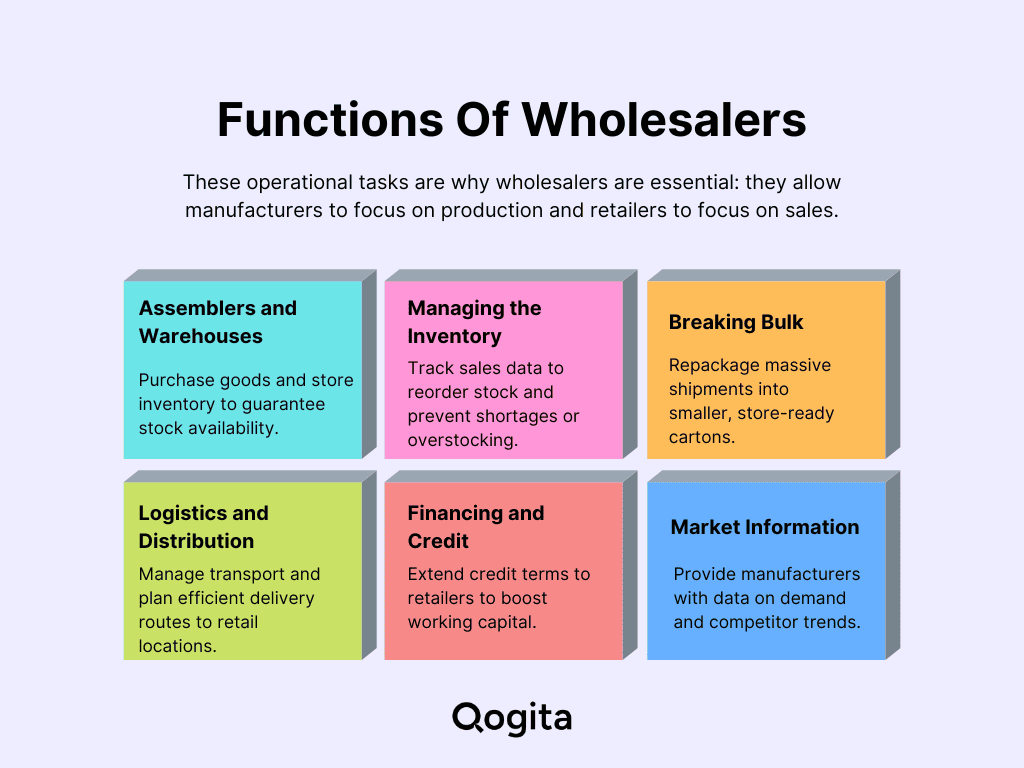
Assemblers and Warehouses
Wholesalers purchase products from multiple manufacturers in advance of demand and store them in their warehouses. This ensures retailers can access goods whenever they need them.
For example, a wholesaler supplying European supermarkets may hold large quantities of packaged foods from different manufacturers so stores can restock quickly without waiting for direct manufacturer deliveries.
Managing the Inventory
A key function of wholesalers is to manage inventory so that products are always available for retailers. If a wholesaler handles 100 different SKUs, some items will sell faster than others.
For instance, a popular beverage might sell 200 units a week, while a less popular snack moves only 20 units. By tracking these patterns, wholesalers reorder stock in the right quantities and prevent overstocking or shortages.
Breaking Bulk
Manufacturers deliver their products in large quantities to wholesalers. The wholesaler then breaks down these bulk shipments into smaller cartons or packages and delivers them to individual shops using smaller vehicles.
This process, known as breaking the bulk, saves manufacturers money and allows wholesalers to maintain a large inventory.
Because wholesalers purchase in bulk, they benefit from discounts and can earn a good margin when distributing products to retailers.
For example, a beverage manufacturer might send 5,000 bottles to a wholesaler, who then repackages them into smaller sets for convenience stores across the region.
Logistics and Distribution
Wholesalers also take care of moving goods from warehouses to retailers. Since they already store the products, it makes sense for them to handle the transportation as well.
They know exactly where retail outlets are located, their operating hours, and how much stock each store needs. This allows them to plan delivery routes efficiently and save on costs.
Another advantage is proximity. Because wholesalers are located much closer to retailers than the manufacturer, they can ensure faster deliveries during peak seasons or emergencies.
For example, if a supermarket suddenly runs out of a fast-moving product, the wholesaler can quickly replenish the stock (something a manufacturer might not manage on short notice).
Financing and Credit
Manufacturers usually avoid offering credit to retailers because it complicates their policies. However, wholesalers have more flexibility in this area.
They can extend credit to retailers who cannot pay upfront, allowing these retailers to buy and sell larger quantities.
For instance, a wholesaler might initially give a retailer a small credit line. If payments are made on time, the credit limit can be increased, helping both sides grow sales.
Wholesalers have the financial depth to manage such arrangements and can also secure bank financing by showing their strong sales volumes.
Market Information
Wholesalers are closely connected to the retail network, making them an important source of market insights.
They can provide manufacturers with details about demand in different regions, feedback on product performance, and even updates on competitor activity.
Many companies involve wholesalers when planning local promotions or sales campaigns.
For example, suppose a wholesaler notices that a competitor’s product is gaining traction in a particular city. In that case, they can alert the manufacturer, who can then respond with discounts or better supply strategies.
This flow of information helps both wholesalers and manufacturers increase sales.
The Economics of Wholesale

Profit is the name of the game, and wholesale is where the rules are written for maximising your retail margin.
It's important to move past simple wholesale definitions to focus on the key economic drivers that directly impact your store's bottom line.
Here we'll explain exactly what you should aim for when negotiating a competitive wholesale discount and how those discounts translate directly into profit.
But first, let's understand the difference between wholesale and retail price:
What’s the Difference Between Wholesale Price vs Retail Price?
The difference is pretty simple:
For example, a retailer may buy a bottle of cream at a wholesale price of €5.00. That same bottle is then sold to a customer in the store for €12.00. The €7.00 gap covers the retailer’s running costs and profit.
How Do Retailers Set a Retail Price?
Retailers use different methods to decide the right price. Some stick to a fixed markup, like doubling the wholesale cost. Others adjust prices depending on demand, product category, or market competition.
For example, a small grocery shop may only mark up basic food items by 20%–30% to stay competitive, while premium skincare products might be priced at 100% or more above wholesale.
What Is a Good Wholesale Discount?
A good wholesale discount typically ranges anywhere between 20% and 50% off the suggested retail price (SRP). The exact number depends on the product and the industry.
For high-margin categories like perfume, a 40% discount is common, while tighter-margin products like household appliances might only offer 20%.
Is Wholesaling Products Profitable?
Yes! Wholesaling is profitable because the business model is built on bulk purchasing.
Wholesalers purchase massive volumes at a low price, then resell them to retailers at a slightly higher price. That difference, the margin, is where the profit lies.
- Margins Vary Widely: In high-volume sectors like packaged foods, margins typically range from 10–15%. However, in specialised areas like the Health & Beauty, margins can often reach 30–40% or more.
- The Demand Factor: High market demand is crucial. If goods are fast-moving, products sell quickly, cash flow stays healthy, and losses from unsold inventory are less. If demand is miscalculated, capital gets tied up in slow-moving stock, immediately shrinking profits.
Ultimately, sustainability in wholesaling relies on operational excellence and strong retailer relationships.
A top-tier wholesaler delivers reliably, offers a wide variety, and keeps prices competitive, ensuring you, the retailer, keep your shelves stocked and your customers happy.
When retailers succeed, they keep placing orders.
Wholesale vs Retail: What’s the Difference?
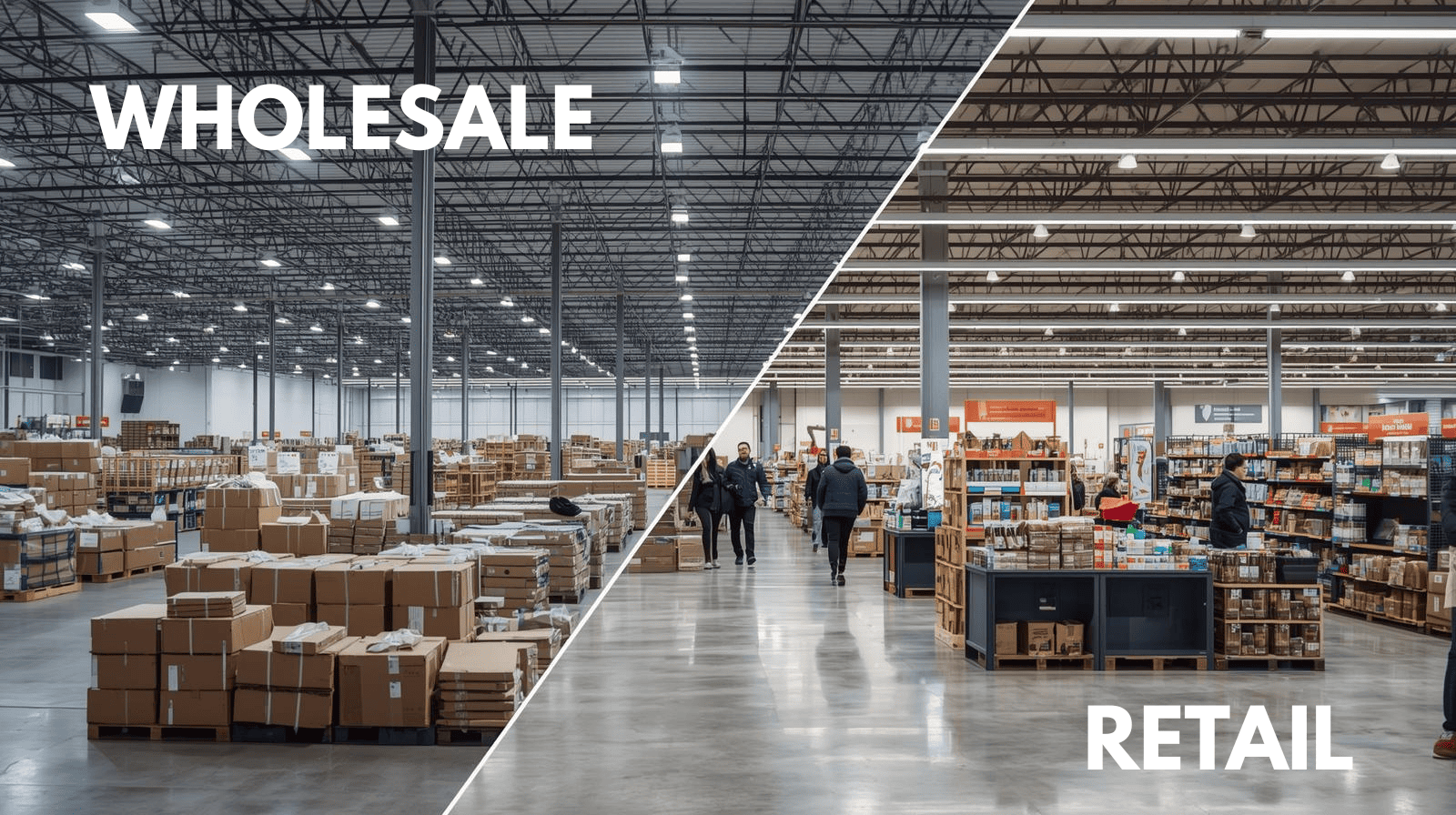
When we talk about wholesale vs retail, the main difference comes down to who you sell to and the volume of goods being handled.
We’ve already discussed what is wholesale and what a wholesaler does, so let's jump straight to:
What Is a Retailer?
A retailer sells products directly to ultimate customers in smaller quantities. Retailers buy goods from wholesalers to stock their physical stores or online shops and then sell them at a higher price, covering costs and making a profit.
The difference between wholesale and retail is therefore clear: wholesalers deal in bulk for business-to-business transactions, while retailers focus on smaller, consumer-facing sales.
Understanding this distinction helps new retailers identify where they fit in the supply chain and plan their buying, selling, and pricing strategies.
For example, a cosmetics manufacturer may sell its products to a wholesaler, who then supplies multiple beauty shops across Europe.
Those shops, acting as retailers, sell the products to customers individually. This flow illustrates exactly how wholesale vs retail functions in practice.
Can Retailers Function as Wholesalers?
Yes! In some cases, retailers can take on the role of a wholesaler by selling products in bulk to other businesses.
While it is possible, it is not always ideal. Acting as a wholesaler requires additional resources, including storage, logistics, and price management, which may distract from the retailer’s core business of serving end consumers.
For most retailers, focusing on their primary market is more efficient. Only retailers with sufficient scale, infrastructure, and expertise should consider branching into wholesale.
Why? Because wholesale involves managing larger volumes, credit terms, and complex distribution.
Benefits of Wholesale For Retailers
For any retailer, success depends on balancing costs against demand. Buying your stock wholesale is a fundamental strategic decision that immediately maximises your profitability and gives you the necessary edge in the market.
1. Maximise Your Profit Margins
The fundamental advantage of buying wholesale is the significant reduction in Cost of Goods Sold (COGS).
- Lower Per-Unit Cost: Wholesalers purchase in massive bulk and pass those economies of scale to you. You secure a much lower price per item than if you tried to buy directly from many different small sources.
- Higher Markup Potential: By purchasing an item for €3 instead of €5, you can still sell it at your competitive retail price of €10, but your profit margin jumps from €5 to €7 per unit. This directly and immediately translates into higher cash flow for your store.
2. Optimise Inventory and Reduce Risk
Wholesalers specialise in managing the massive logistics so you don't have to.
- Less Risk of Stockouts: A reliable wholesale partner makes sure that your best-selling items are consistently in stock. This prevents the dreaded "stockout" scenario, which often causes customers to shop elsewhere.
- Better Inventory Control: Many wholesalers offer smaller batch sizes than a manufacturer would, allowing you to test new products without sinking a massive amount of capital into a full production run. This helps you keep a diverse, fresh selection without wasting precious shelf space on slow-moving inventory.
3. Simplified Sourcing and Supply Stability
Time spent coordinating logistics is time taken away from serving your customers. Wholesalers streamline the entire procurement process.
- One-Stop Shop: Wholesalers typically carry a wide array of products from dozens of manufacturers. This allows you to fill your shelves from a single, convenient supplier, rather than managing hundreds of individual vendor relationships.
- Credit and Payment Flexibility: Established wholesalers often extend credit terms (e.g., Net 30 or Net 60), which is a huge boost to your working capital. You get the stock immediately to start generating revenue, but don't have to pay for 30 or 60 days.
4. Access to New Products and Trends
Wholesalers act as your eyes and ears in the industry. Because they work with so many manufacturers, they are often the first to know about upcoming trends or niche products that could differentiate your store. Leveraging their broad product assortment ensures your inventory is diverse, current, and competitive.
Challenges of Wholesale For Retailers
While buying wholesale is how you secure great margins, it's not without its headaches. The model introduces specific hurdles you need to manage smartly to keep your cash flow healthy and your business on track.
1. Increased Upfront Capital and Storage Costs
When you buy in bulk, you're tying up a significant amount of money and space right away.
- Financial Strain: Large wholesale orders can freeze your working capital. That cash is stuck in inventory instead of being available for your urgent needs like advertising a major sale or hiring extra staff.
- Logistical Burden: Suddenly, you need room for all those boxes. This means incurring additional costs for warehousing, insurance, and the inventory management systems necessary to track it all.
2. Risk of Overstocking and Obsolescence
High-volume purchasing is a gamble. If a product doesn't move as fast as you expected, the financial penalty can wipe out your margin.
- Inventory Write-Downs: If trends change or a product fails, you must discount the excess stock to clear the shelves heavily. That instantly destroys the profit you gained from the original low wholesale price.
- Holding Costs: Every day that inventory sits in your warehouse, it costs you money (storage fees, utilities, security and more). The longer it stays, the more it eats into your profit.
3. Minimum Order Value (MOV) Requirements
Traditional wholesalers protect their own profit by forcing a minimum order size, which is a major pain point for small and growing retailers.
- Forced Purchase Decisions: Retailers must buy more units of a product than they initially want or need to meet the wholesaler's requirement. However, online wholesale marketplaces like Qogita negotiate on behalf of retailers so they can buy smaller quantities and enjoy bulk prices that are usually reserved for large retailers.
- Supplier Dependence: When you have to hit a large MOV with one supplier, it can limit your flexibility. You become dependent on them and might miss out on better deals or the chance to diversify your inventory from other sources.
4. Quality Control and Returns Complexity
When one faulty item is bad, a pallet of faulty items is a disaster.
- Inspection Difficulty: Realistically, you can't manually inspect every single unit in a large wholesale shipment. This increases the risk of selling defective items to your customers by accident.
- Returns Logistics: Wholesalers' return policies are complex and tough. Sending back one unit is easy; sending back an entire heavy, expensive shipment is a logistical nightmare that burns time and money.
Conclusion
Understanding what is wholesale is the fastest path to profitability. The model forces strategic decisions, but the rewards are huge.
You gain a competitive edge by mastering lower COGS, smarter inventory, and faster turns. While traditional barriers like MOVs exist (which we overcome at Qogita), wholesale remains your most powerful tool.
It's not just buying; it’s building the strategic partnership that keeps your shelves full and your margins high.
FAQs
What Do You Mean by Wholesale?
Wholesale means buying and selling goods in bulk. Wholesalers purchase large quantities directly from manufacturers at lower prices and resell them to retailers or other businesses in smaller lots. This process helps products move efficiently through the supply chain.
How Does Wholesale Work?
Wholesalers act as a middle link between manufacturers and retailers. They buy goods in large volumes, store them, break bulk, and then distribute them to retailers in smaller quantities.
Is Amazon Wholesale or Retail?
Amazon is mainly a retail platform, selling directly to customers. However, through its Amazon Business program, it allows companies to make bulk purchases, and through third-party sellers, it also enables wholesale-like opportunities. So while its primary function is retail, it has elements of wholesale built into certain segments.
What Is the Future of Wholesale Distribution?
The future of wholesale is entirely digital and customer-centric. Wholesalers are becoming strategic partners by using AI and automation to offer faster logistics and better inventory planning for retailers.
This shift means more flexible services like omnichannel ordering and real-time data, which helps retailers stay competitive and keep their inventory running lean.

